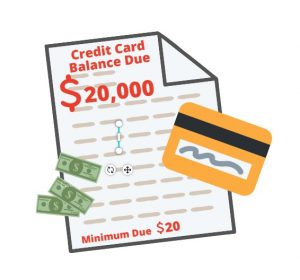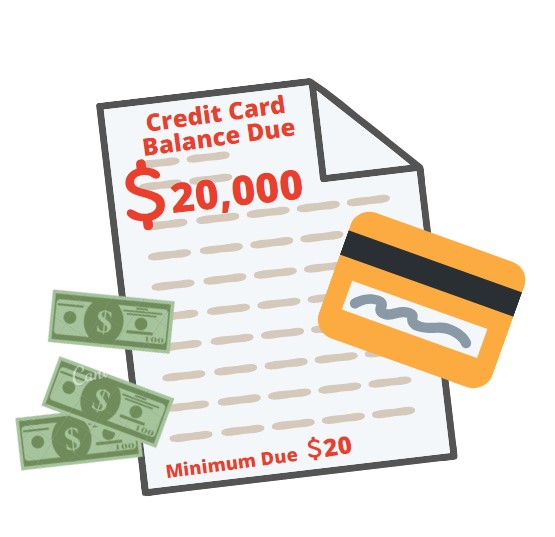If you’re faced with a large amount of credit card debt, it’s easy to send off the minimum payment and hope that eventually the total amount due won’t seem quite so overwhelming.
Not so fast.
While paying the minimum will keep your account in good standing, it isn’t moving you closer to debt freedom like you think it might. There are plenty of other factors to consider and reasons to go above and beyond the requirements set forth by the credit card company.
Making a Credit Card Minimum Payment Won’t Cut It

Before you pay your next credit card bill, think about this.
Interest charges can add up quickly.
Why are credit card companies okay recouping only a small portion of your total balance every month?
Because interest charges are a great source of profit and the longer it takes you to pay off your balance, the more they will receive.
Many people plagued by credit card debt have high-interest rates, which means minimum payments will barely make a dent in the principal of the debt.
If the card in question is still being used regularly, progress will be impeded even further.
Think about this:
Say you have a credit card with a balance of $10,000, an interest rate of 18 percent and the credit card company requires a minimum payment equal to 4 percent of the total balance.
Of the $400 total payment due the first month, a whopping $150 will go to pay interest.
When all is said and done, the card will take 162 months to pay off and over that time, $5,873.50 will be paid in interest charges alone.
Yes, you read that right. Over 50 percent of the total balance will be paid in interest to the credit card company. Not to mention it will take over 13 years to reach a zero balance!
Your credit score can be negatively impacted.
When it comes to your credit score, 30 percent is determined by your credit utilization ratio. This is the total amount of credit available to you divided by the amount you are currently using. The resulting percentage gives potential lenders a snapshot of how risky of a borrower you are – the higher the percentage the worse you will look.
If you have a high amount of debt and continue to pay only the minimum on your cards while still making new charges, your credit utilization ratio and credit score will likely suffer. In turn, other monthly bills that are determined in part by the health of your credit score, like insurance and mortgage payments, could also be negatively impacted. Any increase in these payments can place an even greater amount of pressure on an already rocky financial situation.
Experts recommend keeping your credit utilization ratio at or below 30 percent — keep this in mind when looking at the amount of credit card debt you’re currently carrying.
Minimum payments block you from achieving total debt freedom.
Achieving debt freedom is largely a battle of wills and a practice in staying motivated. If you are routinely sending in monthly payments only to receive the next statement with a balance that barely moved, it’s easy to give up hope and think that any action you take is fruitless.
Being able to track your progress, reach milestones and plan for a debt freedom date that isn’t a decade away can give you the motivation you need to continue on the journey and keep picturing a future where you aren’t anxiety-ridden when you see a credit card statement in the mail.
That is just as beneficial as not handing over thousands of dollars in interest to your credit card company.
Check out these additional resources about making minimum payments.
If you want to see how much you could be paying in additional interest charges according to your balance, interest rate and minimum payment rate, check out this helpful calculator from Bankrate.com.
In addition, DebtWave’s credit calculators can help you see how much you are working just to make your monthly minimum payments and how much you could save by making a fixed monthly payment instead of the minimum payment.


[…] monthly student loan payments and not get stuck in a cycle of high-interest debt by only paying the minimum payments toward your credit […]
[…] because you made a money mistake, like not making more than minimum payments on your high-interest credit card, it doesn’t mean you can’t catch up by saving more or paying […]